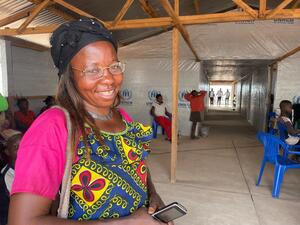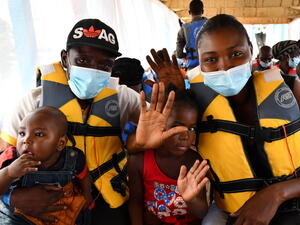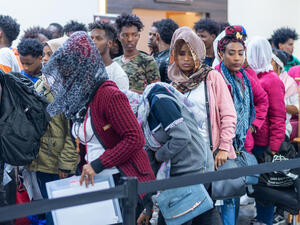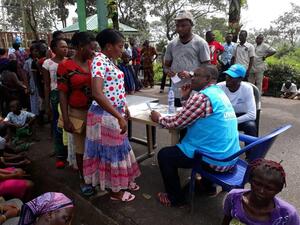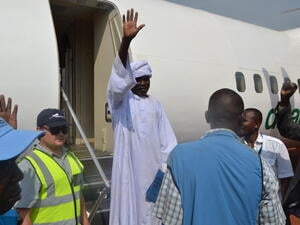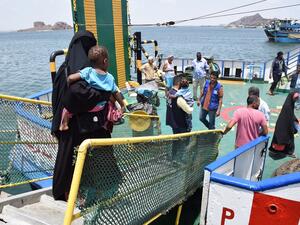UNHCR launches plan to help Congolese refugees return from Zambia
UNHCR launches plan to help Congolese refugees return from Zambia

Young Congolese refugees throng around a visitor outside their classroom in Mwange Refugee Camp. Many could soon be going home under the voluntary repatriation programme.
MWANGE REFUGEE CAMP, Zambia, May 3 (UNHCR) - More than 400 Congolese refugees who had sheltered in Zambia headed back to their homes in the Democratic Republic of the Congo (DRC) on Thursday as the UN refugee agency launched a three-year voluntary repatriation programme.
"This is a historical day because it marks the start of the organized voluntary repatriation of Congolese refugees from Zambia," said Vedasto Mwesiga, UNHCR acting representative in Zambia. "Having just concluded the repatriation of Angolan refugees in January this year, today is the beginning of yet another milestone in our search for durable solutions for refugees in this country."
The ceremony at the refugee camp near the DRC border in the north of Zambia followed negotiations between UNHCR and the two governments over the details of the programme, which they agreed to continue until the end of 2009.
Senior Zambian government officials attended the departure of the first convoy with 414 returning refugees headed to the Zambian town of Mpulungu on eight buses and four trucks. They will leave Zambia by boat on Friday and travel along Lake Tanganyika to the DRC port of Kalemie.
"We plan to repatriate up to 20,000 Congolese refugees in 2007," Mwesiga said. "Zambia currently hosts about 60,967 Congolese refugees. A total of 43,854 are in camps - more than 21,000 in Mwange and 19,000 in Kala - 2,113 in urban areas and 15,000 spontaneously settled outside the camps."
Mwesiga said refugees had to make their own decisions on whether to return to DRC, but UNHCR believes most will repatriate because of the improved security in their homeland. The country last year held democratic elections after years of bloody conflicts. The minister of Zambia's Northern Province, Lameck Chibombamilimo, called on Congolese refugees to return home and join in rebuilding their country.
About 300 Congolese refugees sheltering in Mozambique have also requested UNHCR assistance to return home and are expected to depart over the next two months. Thirteen Congolese refugees returned from Malawi earlier in the week.
The start of the Congolese repatriation follows the successful completion of a four-year voluntary repatriation to Angola, mainly from Zambia and DRC. The programme officially ended in December, but the last of the nearly 410,000 Angolan returnees were flown home in March. Of those, nearly 139,000 refugees returned with the assistance of UNHCR - including 71,000 from Zambia.
"UNHCR will work strenuously with the government, the International Organization for Migration and implementing partners to ensure that there are steady, expeditious and regular repatriation convoys to Congo in accordance with set international standards," Mwesiga said.
The voluntary repatriation programme to DRC is to take place in phases. The initial convoys will take refugees to areas that meet conditions necessary for organised return: they can be reached by road, landmines have been cleared, and basic services such as schools, health clinics and potable water are available.
In areas of DRC not yet suitable for repatriation, UNHCR is working with the government and other partners to prepare them for returns in the coming months.
"I know life back home will be tough but I have to start afresh," said 33-year-old Mambo Sanog, who fled fighting in DRC eight years ago and was returning alone after the death of her husband while in exile. Like all the initial batch of returnees, she had fled from the Kalemie area.
Returnees will spend the first days back in the DRC in a reception centre where they will receive mine awareness training, HIV/AIDS information and any necessary medical assistance.
Before leaving for their home areas, refugees receive food rations, blankets, soap, kitchen items, buckets and a construction kit to assist in rebuilding homes. Later in the year, they will receive seeds and farming tools in their home communities to help them become self-sufficient.
In addition to the Congolese refugees, Zambia hosts about 40,000 Angolans who did not repatriate and nearly 17,000 refugees of other nationalities.
"I wish to underline that over the years, UNHCR continued to receive support, cooperation and excellent relations with the government of Zambia and its people," Mwesiga said. "In the true spirit of African generosity, Zambia kept the asylum door open for persons who genuinely needed protection."
By Kelvin Shimo in Mwange Refugee Camp, Zambia

